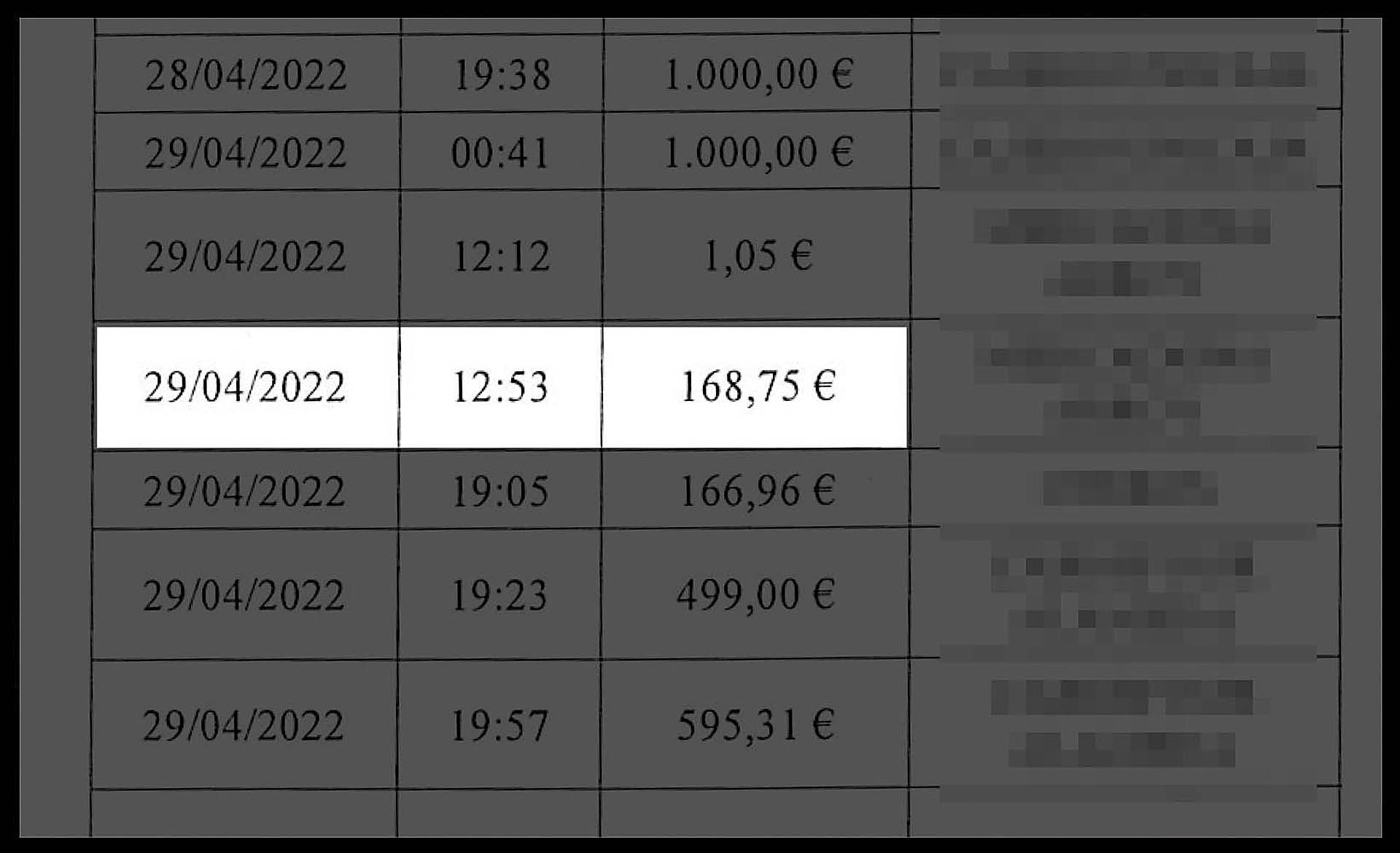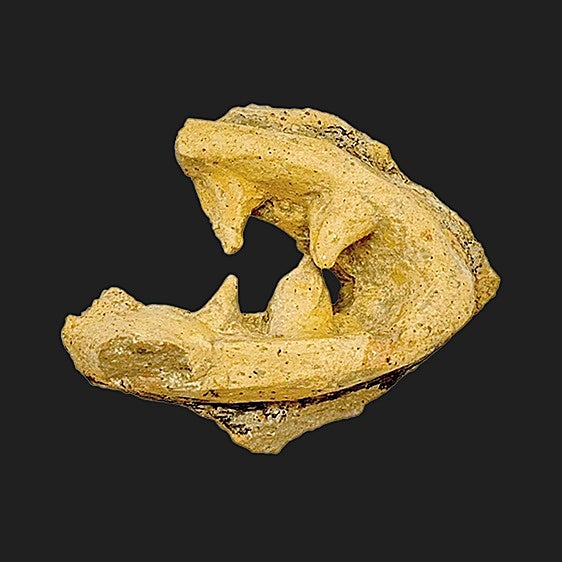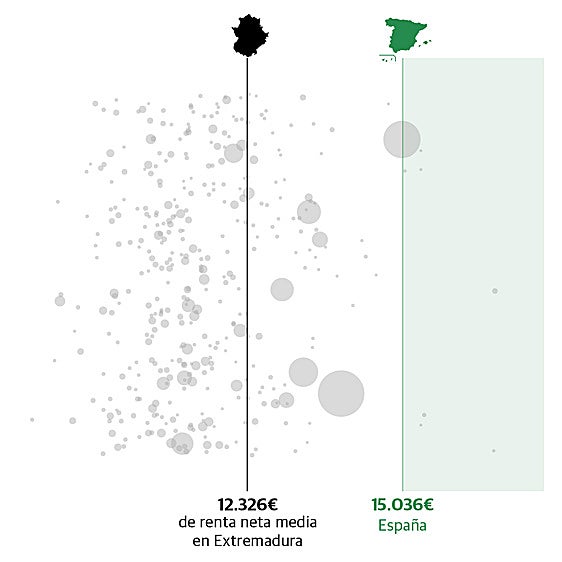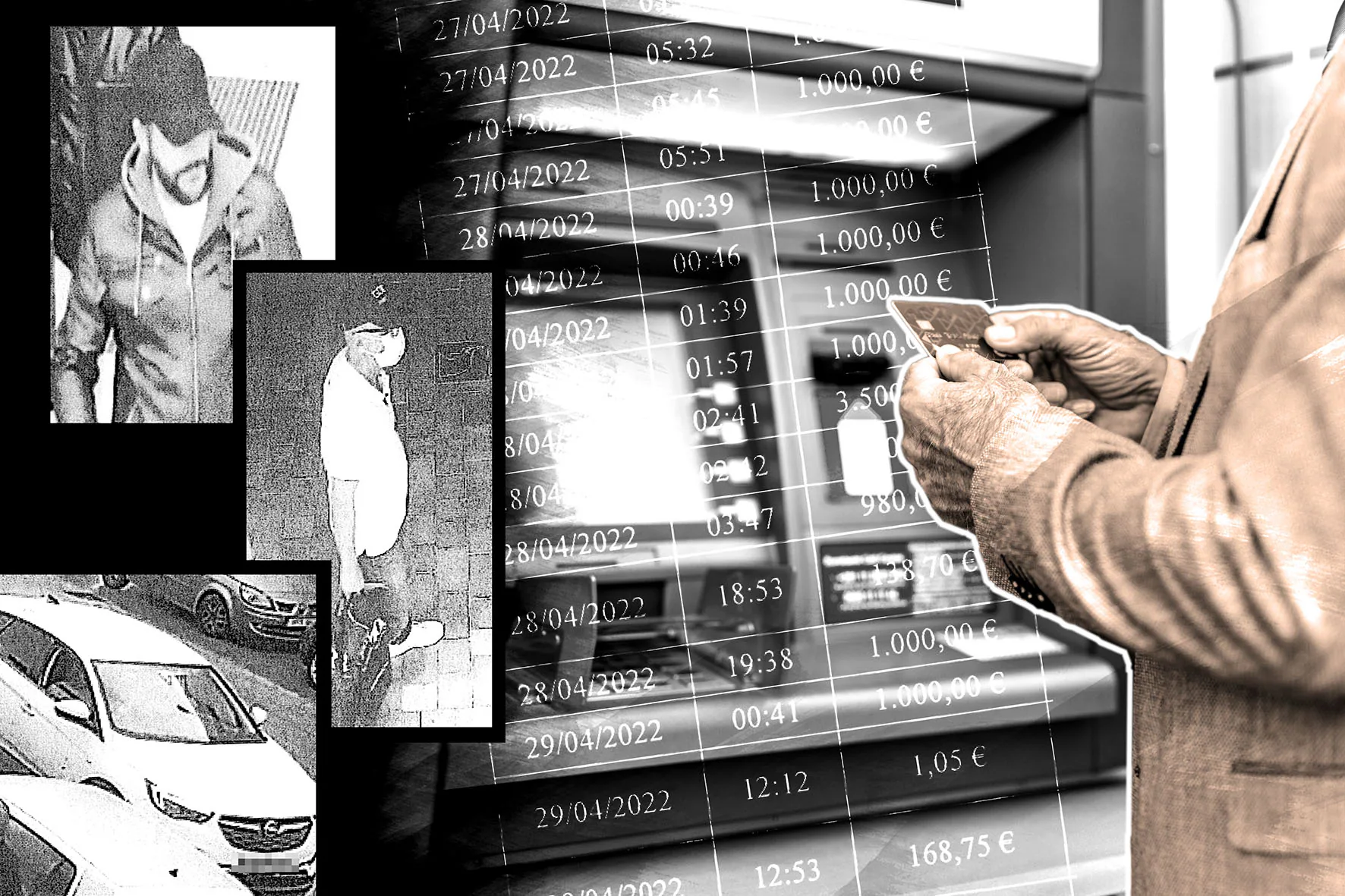The scamming of a pensioner that ended in suicide: a supermarket trolley uncovered the plot
The victim, an elderly Benalmádena resident, was left "without even enough money for food"; 60,000 euros, his entire life savings, had gone
Juan (not his real name) was retired and lived in a small apartment in Benalmádena. There he was visited by his son, daughter-in-law and, above all, his grandson, who went to see him regularly to take him food, run errands or just for company. Once a month, as a priority, he'd ask his grandson to accompany him to the bank to withdraw 1,000 euros because, due to his age, he feared making a mistake.
Juan's routine went to pot on 9 May, 2022. That morning, he went to the wardrobe to fetch his credit card where he always kept it along with his bank's passbook and a slip of paper bearing the PIN number. But this time they weren't there. Juan called his grandson to help him search. They found nothing in the house, so they went to the bank.
At the branch they gave him a bank statement with the latest account movements. There were 73 transactions made on his credit card between 24 April and 10 May, 2022. Juan did not recognise any of them. The last time he'd used the card was on 18 April, when his grandson had gone with him, as usual, to withdraw 1,000 euros from the ATM cash machine.

When the bank employees added up the 73 transactions, Juan's world came crashing down. In just two weeks, a person or persons unknown had spent 58,210.44 euros on his current account. When he reported the crime, the pensioner told police that these were his life savings and that this put him in an «extremely perilous» situation.
Juan was literally left with less than 100 euros in his account. They had not left him enough money «to eat» nor to cover monthly bills, as he stated at the police station on the morning of 12 May. His mental health went downhill fast. On 6 June, his body was found on wasteland in Benalmádena. He had taken his own life.
The National Police launched an investigation to clarify what had happened. Juan had told officers that no one except his son, his daughter-in-law and his grandson had access to his apartment. His grandson had the only extra key to the house in case of emergencies. He also assured them that he had not given permission for anyone else to enter his home and nothing was missing, so he had no clue as to who could have taken the passbook and card.
At the time none of their inquiries provided answers to this puzzle as there were no signs of forced entry. Sources close to the case suggested two hypotheses. The first, that Juan could have left the folder in which he kept the passbook and card in a nearby café. The second, that on some day or other, when throwing out the rubbish, he did not fully close the door of his apartment.
Bank statement lead
Where the police have made progress is in catching up with those allegedly responsible for the fraud. The investigating officers followed a lead on Juan's bank statements, making a list of the names of businesses and ATMs that appeared in the document and visiting them, one by one, to check which had security cameras.
There were all sorts of places where Juan's card was (ab-)used, everything from food chains and department stores to nightclubs and escorts in Benalmádena, as well as purchases from jewellery stores and furniture shops. In one cocktail bar alone, in Plaza Solymar, the fraudster(s) ran up bills totalling more than 18,000 euros in just over a week.
This groundwork allowed the police to seize dozens of videos and, upon viewing them, they spotted a number of suspects where people had entered the establishments at around the time the transactions occurred. However, not one person could be identified from these images as in all the recordings they were wearing baseball caps and face masks.
The officers were left with no choice but to identify them as «SuspectMale 1», «SuspectMale 2», «SuspectMale 3», and «SuspectFemale 1». They included in the case report a mapping of each suspect's location by cross-referencing their recorded images to the transactions made on Juan's card.
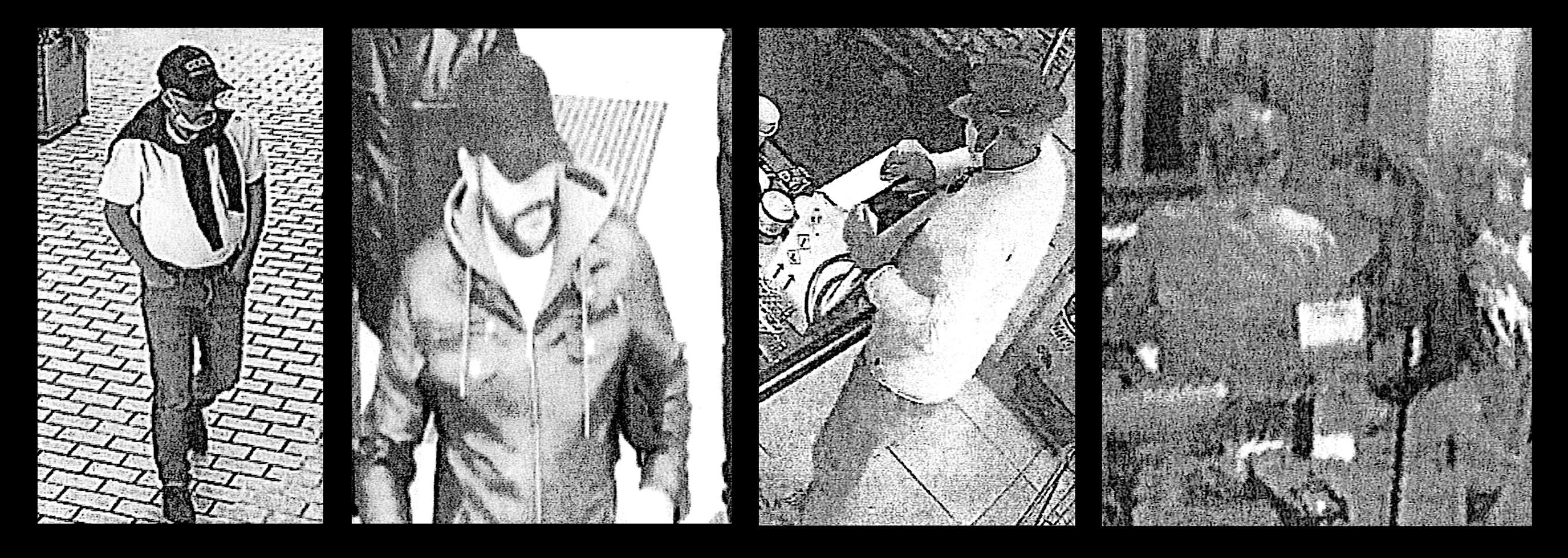
After watching the videos time and time again, the officers noticed a detail that was key to cracking the case. On 29 April, SuspectFemale1 spent 168.75 euros at Mercadona in Arroyo de los Ángeles, Malaga. After paying with a card, and before leaving the store, she wrote something down in a book that the cashier handed to her.
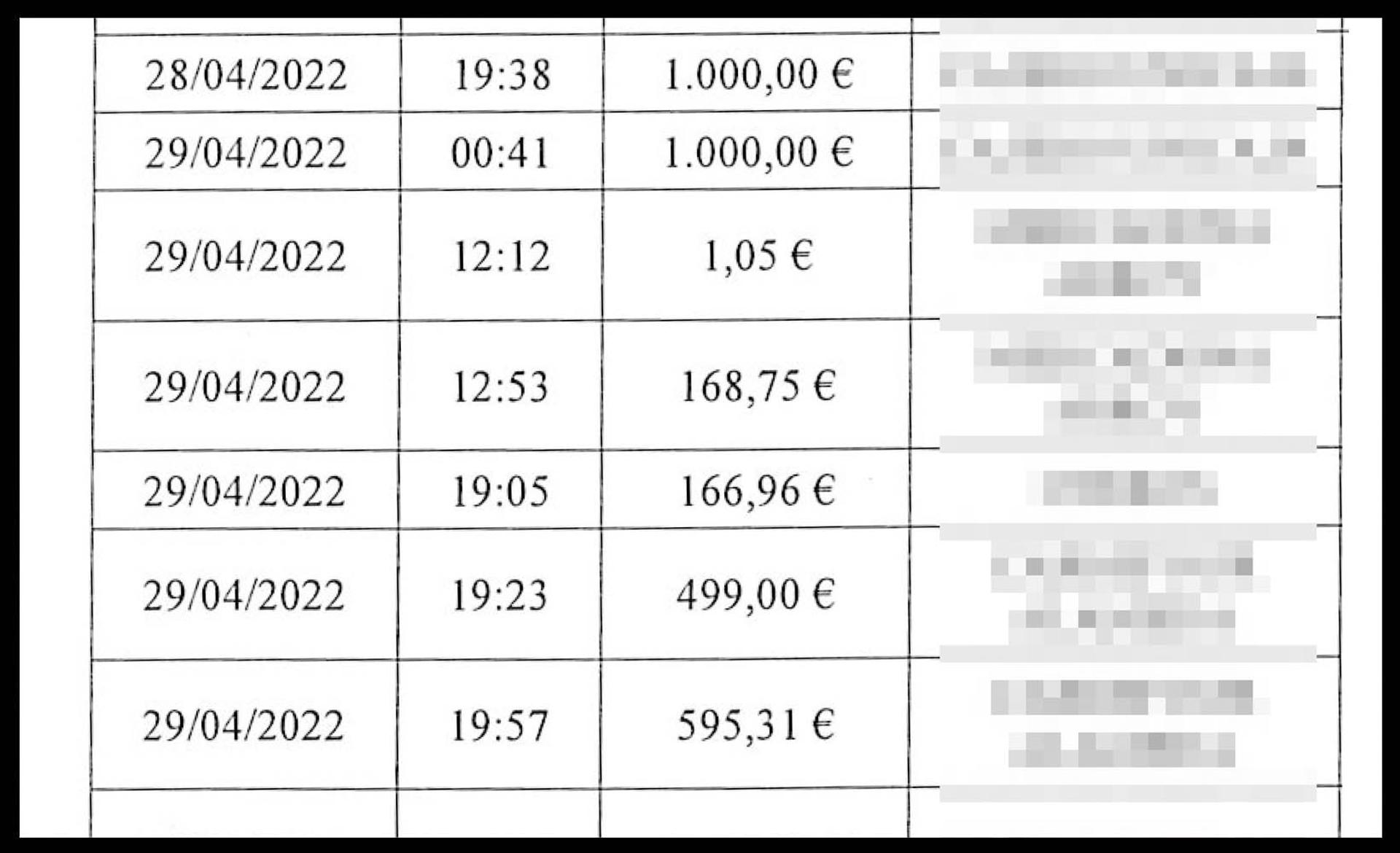
AUX STEP FOR JS
Officers immediately went to the supermarket and met with store management. One manager explained to them that, when a customer needs to wheel their purchases to their vehicle outside the supermarket, cashiers request their details to enter into the store's registry for trolley loans. Police now had an ID for SuspectFemale1.

In another of the recordings, they observed how two of the male suspects (1 and 2), after using the card, got into a SUV sports utility vehicle that was parked in the vicinity of the business in question. The police officers checked the licence plate and discovered that the main registered driver, female, was also the owner of a local café.

It just so happens that the first payment taken from the victim's account was done in that café in the early hours of 25 April. The payment was for only 10 cents. Police are convinced that it was a test to verify if the card would work for in-store purchases.
After fully investigating this ring of suspects, there were clearly no loose ends to tie up. The café owner was seemingly the partner of one of the men allegedly seen on CCTV, specifically SuspectMale1, while the female who had shopped in the supermarket and had also provided her written name to borrow a trolley, was the former partner of SuspectMale3.
Three with police records
Of the four suspected fraudsters, three already had police records, with a higher number of arrests (31) put down to just two of the men. The young woman identified in the supermarket was the only one with a clean record. She was also the only one to give a statement to police. She said that one day her ex-boyfriend showed up at her house and, seeing that her fridge was empty, he took her to the supermarket and gave her the card and PIN to pay for her groceries. She didn't notice the name on the card as she had no reason to suspect that it belonged to someone else.
Police coordinated raids to search the homes of all suspects. In the home of the café owner, also the residence of two others under investigation, officers found items purchased with the stolen card, such as a ring, Versace trainers, a gold chain, medallion and various items of clothing.
Subsequently, four other people, who worked in some of the places where purchases were made, were also arrested on suspicion that they were in cahoots with the thieves. According to police inquiries, these people must have colluded with the fraudsters by allowing the card to be used in their place of business, later collecting their share of the profits and feathering their own nests from the illegal activity.

